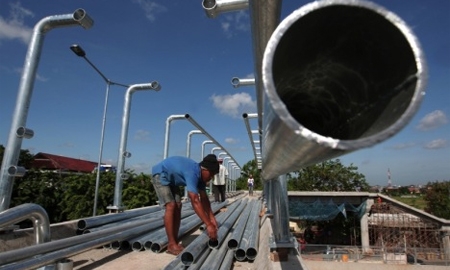“The need for infrastructure all over Indonesia is immense. The sheer physicality of the country is a challenge,” says Prof Dr Armida S. Alisjahbana, Minister for National Development Planning and chairman of the National Development Planning Agency (Bappenas). “The lack of new infrastructure investment against the country’s continuous growth has made the backlog more evident than ever. But we feel we are now in a good position to take on this challenge.”
Trade Minister Gita Wirjawan, former Chairman of the Indonesia Investment Coordinating Board (BKPM), says: “The easiest way of convincing an investor to go to any country is by virtue of the existing infrastructure. We need to build roads and ports in a quick and efficient manner. The success of this depends greatly on certain institutional reforms, which we are aiming to get off the ground this year – the first of which is the Land Law. If we can quickly set up the right infrastructure, people will subscribe to Indonesian investment a lot better. It has been pretty good so far, but I think we can do more. The sky is the limit in terms of where we can be in three to four years’ time.”
Progress is under way. With the help of
PT Pembangunan Perumahan (Persero) Tbk, known widely as
PP, both the company and the country are making massive inroads into the development and sustenance of Indonesia’s infrastructure.
State-owned PP was established in 1953 and has since become a major player in the national construction industry. Its main area of business is contractor services, including high-rise buildings and civil work, such as irrigation, harbours, airports, roads, bridges, dams and hydropower installations.
‘We need to build roads and ports in a quick and efficient manner. If we can quickly set up the right infrastructure,
people will subscribe
to Indonesian
investment a
lot better’
GITA WIRJAWAN
Minister of Trade Indonesia is huge, with some 17,000 islands and over 50 per cent of its 245 million people are under 29 years old. It is also the third largest democracy in the world |
Besides the construction field, PP also takes on the role as developer, especially in managing, renting and selling high-rise buildings. PP has plans to expand by investing in – as well as constructing – various infrastructure and energy projects. The former president director of PP Mr Musyanif provides some insight into the ongoing infrastructural plans for Indonesia: “When the Land Law is completed, PP will be called on by the President for a meeting to build the Trans-Java Highway. Since going public in February 2010, PP has decided on a growth strategy as an investor as well as contractor.
“We started as investors, especially in the infrastructure sector, to support the Government’s infrastructure development programme. We have been awarded two power plant projects in Cilegon as an EPC (engineer, procure, construct) contractor and also – as an investment company – awarded the PLTG 60MW power plant project at Talang Duku, Palembang, in South Sumatra.”
Mr Musyanif believes that once the Trans-Java Highway is completed it will show the world how Indonesia is moving forward with its large-scale development plans.
“For example, since President Soeharto’s regime in the 1980s until now there were only 370 miles of toll roads built. After the new regulations have been implemented, there shall be 150 miles within two years. That is proof of the ongoing improvement in infrastructure,” he says.
The company is collaborating with Indonesian toll-road operator Jasa Marga on the Serpong-Cinere toll-road project. “We also plan to take over one by Thiess Indonesia, and a second one at Aloha, Tanjung Perak, Surabaya,” says Mr Musyanif.
Another toll road under construction as part of the Trans-Java Highway is a collaboration between Jasa Marga and Wijaya Karya at Mojokerto in East Java. “However there is a joint venture between PP and Jasa Marga to create a new city there,” adds Mr Musyanif. “We will be developing 1,500 hectares for homes and shops, designed by the well-known architects Townland.”
The Minister of Public Works, Djoko Kirmanto, also reinforces the need for up-to-date infrastructure. “In order to accelerate and expand our economic development we must improve our infrastructure,” he says. “We need sufficient electricity, roads, water supply, airports and seaports. At the Ministry of Public Works we are developing roads, as well as raw and drinking water.”
As a huge archipelago, inter-island connectivity is vital. “We have completed a bridge connecting Java and Madura. Now we are planning an 18-mile bridge to connect Sumatra and Java,” says Mr Kirmanto. “PP initially noticed investment opportunities in the energy and port sectors. It has joined with Pelindo II as operators, and total investment was approximately 22 trillion rupiahs (£1.58 billion) in six years. There are currently very few ports, so we wish to build more.”
Last year the UK was the second-largest investor in Indonesia, after Singapore. Other overseas countries are also getting involved, with Japan contributing to the archipelago’s economic corridor and China contributing towards roads and power. “We do not differentiate between investment countries, whether they are European or Asian, because we need our projects done,” says Mr Kirmanto. “Any country in the world can come and bid on our projects.”
PT Sarana Multi Infrastruktur (Persero), or PT SMI, forges relationships with private investors and multinational institutions to create public-private partnerships that boost the country’s infrastructure. “We act as a facilitator between the project owner and the investor. We can be a window for an infrastructure project. As a catalyst, we would like to make things easier for the investor,” says CEO Emma Sri Martini, who highlights energy and transportation (for regional or domestic connectivity) as the main sectors ripe for investment.

0 COMMENTS